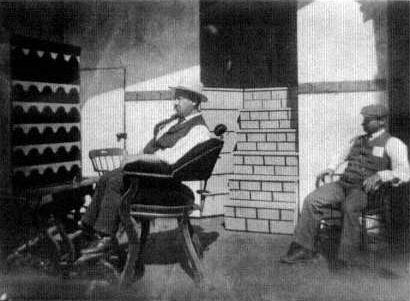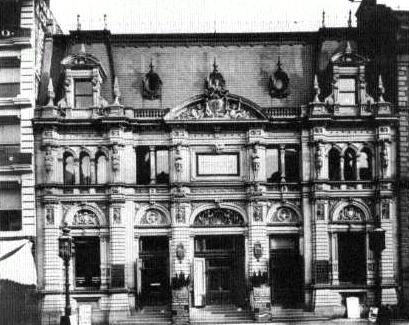Edison On the Legal Offensive
Although Thomas Edison copyrighted and marketed over 130 films during 1897, his enterprise was competing against several other motion picture manufacturers. Among the most prominent were the American Mutoscope Company (i.e., Biograph) and the International Film Company in New York; Edward Amet in Waukegan, Illinois; and Sigmund Lubin in Philadelphia. As a result, the volume of Edison's film-related sales changed little. For the year ending March 1, 1898, film sales were down 11 percent to $75,250, while film profits remained virtually unchanged at $24,439. The marketing of Edison's projecting kinetoscope had gone fairly well, but projector sales of $27,802 only yielded profits of $4,826. If Edison hoped to regain his dominance of the motion picture industry, patent litigation seemed to offer the most promising route.
Edison filmmakers at ease on the set for What Demoralized the Barbershop
. William Heise in barber chair; possibly John Ott behind him.
As Gordon Hendricks has shown, Edison had difficulty acquiring patents for his motion picture camera, since his innovations had been anticipated in almost every respect by previous inventors. On February 21, 1893, Edison was finally issued patent no. 491,993 on application no. 403,535 for his method of steadily advancing the film. The process of revising application no. 403,534 took even longer owing to excessive claims and the delaying tactics of Edison's lawyers.[19] (Since patents were only good for thirteen years, delaying their date of issue was often an effective strategy for extending the patentee's control over an industry.) Finally on August 31, 1897, Edison was granted his motion picture camera patent, no. 589,168.
In December 1897 Edison lawyers launched a legal offensive against a number of producers and exhibitors. Edmund Kuhn's and Charles Webster's International Film Company was the first target.[20] Rather than fight the case in court, International closed its doors. Maguire & Baucus, one of Edison's principal selling agents, but one that also sold Lumière and International Film Company subjects, was sued at the same time. They did not contest the suit either. While F. Z. Maguire continued working with the Edison organization and sold its films during much of 1898, the partners gradually moved their activities to England.[21] Lubin was sued on January 10th and Biograph on May 13th: both contested these suits and remained in business.[22] Over the year, Edison sued a
The Eden Musee.
number of other "infringers." Some of these acknowledged the inventor's patents and became licensees. With licensing arrangements characterizing Edison's commercial practices during the late 1890s, we now turn to look closely at Edison's first motion picture licensee—the Eden Musee.

